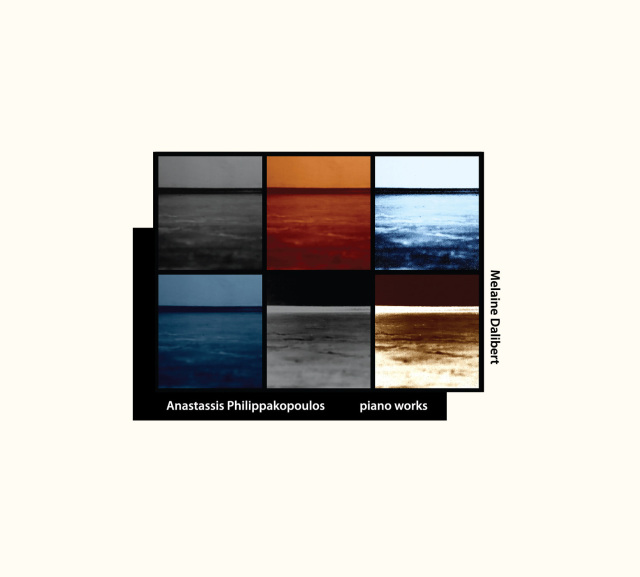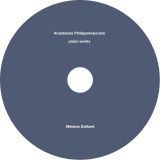- Melaine Dalibert
- >
- Melaine Dalibert - Anastassis Philippakopoulos: piano works (CD)
Melaine Dalibert - Anastassis Philippakopoulos: piano works (CD)
SKU:
$14.00
$14.00
Unavailable
per item
elsewhere 010
This album contains twelve pieces for solo piano composed by Greek composer Anastassis Philippakopoulosa, performed and realized by French composer/pianist Melaine Dalibert. Cover art by Denis Sorokin, design by Yuko Zama. 4-panel gatefold wallet.
For lossless AIFF (16/44) file, go to this page.
For digital HD FLAC (24/96), go to this page.
|
TRACK LIST
1. piano piece (2013) 2:32 2. piano piece (2014) 3:07 3. piano piece (2015) 3:32 4. piano piece (2016) 2:52 5. piano piece (2017) 3:07 6. piano piece (2018a) 3:27 7. piano piece (2018b) 3:06 8. five piano pieces - 1 2:39 9. five piano pieces - 2 3:05 10. five piano pieces - 3 2:26 11. five piano pieces - 4 2:31 12. five piano pieces - 5 2:19 (released February 14, 2020) CREDITS
compositions by Anastassis Philippakopoulos piano by Melaine Dalibert recorded by Herve Jegaden and David Launay at HD Studio in Saint Maugan, Britain, France on July 24, 2019 mixed and mastered by Taku Unami cover art 'sea' by Denis Sorokin inside photograph by Anastassis Philippakopoulos design by Yuko Zama produced by Yuko Zama p+c 2020 elsewhere music www.elsewheremusic.net Anastassis Philippakopoulos' music is published by Edition Wandelweiser. https://www.wandelweiser.de |
Greek composer Anastassis Philippakopoulos has been a member of the Wandelweiser composers collective since 2003. He pursues his own compositional style to create a new kind of tonal music, deeply associated with his individuality and the surroundings of his life in Athens, a unique blend of stoic minimalism, the warm colors of modern romanticism, and the introspective depth of Zen.
In Philippakopoulos' piano works, each tone is closely connected with the previous and the subsequent tones via long resonances, forming a simple yet poignant melody that contains a magnetic power to draw the listener’s ears. The intensity of a single tone of his piano pieces often evokes a beautiful stone, organically formed over the course of a very long time. In fact, Philippakopoulos takes several months to a year to compose one short 2-4 minute piece. On this album, Philippakopoulos' twelve solo piano pieces (composed from 2005-2018) are performed by a rising French composer/pianist Melaine Dalibert, who is known for a unique algorithmic compositional style as well as his interpretations of works by Giuliano D’Angiolini, Tom Johnson, Peter Garland, and many others. Here Dalibert realized the transient, meditative beauty of Philippakopoulos' piano works by inducing rich harmonics in the tranquil afterglows mysteriously tinged with shadows, brilliantly conveying the immense and profound world of Philippakopoulos' music narratively and poetically. REVIEWS
Steve Smith, The New Yorker With tension on the rise, “piano works,” a mesmerizing new collection of a dozen brief pieces by the Greek composer Anastassis Philippakopoulos, offers a needed refuge from turmoil and anxiety. Philippakopoulos is a member of the Wandelweiser Collective, a loosely knit international aggregate whose members are bound by their fascination with the philosophical weight and dramaturgical potential of silence. Each of his compositions, ranging from two to four minutes in length, reflects long months of labor and notes selected with a jeweller’s exactitude. The album begins with seven works written between 2013 and 2018, in which single notes hang like pearls in monodic strands; in the first of “five piano pieces” (2005-2011), stark, dissonant clusters register with an almost shocking impact. Melaine Dalibert, himself a composer whose works similarly deal in patience and space, is an ideal interpreter of such beguilingly modest music, and this sensitive recording lets every detail resound. (3/20/2020) Michele Palozzo, Esoteros "Before you play two notes, learn how to play one note ... And don't play one note unless you've got a reason to play it." If this precious maxim offered by Mark Hollis applied to every musician, it should be all the more true for those who practice reduction as the only possible aesthetic, in the opposite direction to the experiential hypertrophy of the world. In the context of the most radical minimalism, each sound cell has a specific weight above the average: that's why Anastassis Philippakopoulos' short scores enacted such a simple and powerful aura, where the natural resonance - the white space of the pentagram - has an equal value with respect to the notes, of which it collects and combines the shadows and dissolves them in the air. The Elsewhere label run by Yuko Zama welcomes the Greek composer in its catalog not only for elective affinity - he too has been part of the Wandelweiser collective since 2003 - but also by virtue of the direct link with the already known Melaine Dalibert, featured here for the first time as a performer only. Two specular poetics, as can be understood since the first minutes listening to the 'piano pieces' dated from 2013 to 2018: they're also equal in their marine inspiration, the slow breaking of the undertow (" Ressac ") and the horizon cut in half by the sky, also shown in the photo collage on the cover. Laying one's eyes on the vast flow of the waves, forgetting their sound and reimagining it from within: as for the unavoidable partiality of the framed image, the present moment of Philippakopoulos' music also implies that which is beyond its extremes, it has no enclosed beginning nor end in that it does not narrate, but only contemplates, and in said contemplation its meaning is fulfilled. No doubt influenced by the common nationality, thoughts spontaneously return to the imperturbable sequence shots of the master Theo Angelopoulos, except that the composer's "gaze", forgetful of historical time as well as that streaming before us, seems to truly exist only in the fleeting instant in which the fingers of the pianist awaken it, in a parenthesis ideally detached from the troubled human events that have taken place over the millennia. But this should not mislead us in considering Philippakopoulos' practice as an absolute abstraction, an artifice hatched to conceal the feelingfrom which these pieces unfold: unequivocally they are, in fact, motifs of the soul comparable to those of Zbigniew Preisner, apt to give voice to the inexpressible through slender but vibrant musical figures, outlined just enough as to not make them completely impalpable. After a path followed in single steps, strenuously limited to only one key at a time, by contrast the attack of the "Five Piano Pieces" (2005-2011) is perturbing and almost violent in its direct juxtaposition of low and high registers, sudden thrusts that evoke the sinister pace of Ligeti's "Wanted Music". So at last a latent romanticism makes its way and tends to characterize the five fragments with greater determination, infused with a sentiment sometimes tormented, sometimes subduedly melancholic; only the last piece settles once more in a colorless limbo, a pacification of oriental ancestry that in just two minutes brings the poetics of Philippakopoulos back to the territories of the post-Cagean avant-garde - a "return to order" which, however, does not cease to question the fragile balance between the temporal dimension, sound and silence. The symbiotic identification of Melaine Dalibert, by nature in full familiarity with the aesthetics of the composers of quiet , leads us to the discovery of an author still little known but to whom the climate of contemporary music will not fail to give prestige in the years to such as. For its part, Elsewhere continues virtuously along the editorial line which, less than two years after its foundation, has already imposed it as a point of reference in the discographic scenario of an increasingly less elitist sector, originating from and being aimed at a sensitivity whose character is virtually universal (2/12/2020) Bill Meyer, Dusted Magazine When Melaine Dalibert set out to record this album, he could not have foreseen the moment into which it would emerge. It was recorded during a single session at a church in Brittany, and no one executes a program of compositions as well as he had done these without spending significant time to select, study and learn them first. Moreover, in the pianist’s own work as a composer, he practices patient development. Dalibert has spoken of letting a piece spend several months in his head, mulling it over while he runs or rides the train, before he first sets pencil to paper to write it out. He did not compose the pieces on Anastassis Philippakopoulos: piano works, but it is reasonable to assume that he applied some of his own preparatory process to the tasks of readying and executing this project. And yet this album, which was recorded on July 24, 2019, and released on February 20, 2020, is both descriptive of the moment we find ourselves in right now and prescriptive of how to survive it. In April 2020, many nations are trying to slow the advance of the COVID-19 virus by instituting more or less severe degrees of societal shutdown. Around the world, people are confined to small spaces. Each of the 12 pieces on this album, which is devoted to solo piano compositions by Anastassis Philippakopoulos, leaves a correspondingly small footprint; the shortest lasts 2:19 and the longest, 3:32. To live around each other under such circumstances, it helps not to impose, and Dalibert plays each piece gently enough not to rattle anyone on the other side of a thin wall. In a time when no one knows how long the hand sanitizer, yeast, and toilet paper must last, this music models the husbanding of resources. Dalibert lets the notes ring and decay, judiciously sculpting one sound’s fading with pedals before moving on to the next one. And in a time when it behooves people to think before they act, lest they or someone else suffer grievous or fatal consequences, Philippakopoulos’ compositional method models deliberate decision-making. It took him up to a year to write each piece, pondering and singing back each bar for weeks as he considered which note should follow its predecessor. The Athens-based composer identifies with the Wandelweiser collective, a post-Cage-ian community of composers and musicians who respect silence as much as sound, and it shows in the ways he finds for either element to expand and contract in dynamic relationship to each other. Like certain of his Wandelweiser fellows, and unlike a lot of progress-oriented composition from the past century, he’s not averse to writing a frankly beautiful melody. But he’s also a devotee of poetry, particularly haiku. His parsimonious determination to make each act within a brief sequence of symbolic actions signify its own essence, and also transform the events that precede and follow it, transfers haiku’s virtues intact to the musical realm. (4/30/2020) John Eyles, All About Jazz This album is the tenth released by the Elsewhere label since its launch in the spring of 2018. It is the third of those ten to feature the French composer and pianist Melaine Dalibert. Whereas on the previous two albums, Dalibert played his own compositions, here he performs piano compositions by the Greek composer Anastassis Philippakopoulos who has been a member of the Wandelweiser composers collective since 2003 and had his first Edition Wandelweiser album Solo Pieces issued in 2005. Where Dalibert's own compositions have often included clusters of notes and made use of the piano's sustain pedal, Philippakopoulos' piano pieces lean more towards single notes which are allowed to resound and fade away before another is played. Philippakopoulos' own sleeve notes to Solo Pieces consisted of nine couplets which may have expressed his thoughts on composing but also described some of his work. The first couplet was: "music that allows sounds to sound: to die away, completely, into silence"—which could be a quote from the Wandelweiser manifesto, if such a thing existed; it certainly describes the music here perfectly. The Philippakopoulos compositions here date from 2005 to 2018 and, at the time of recording, in July 2019, represented his most recent works for solo piano. They are all comparatively short, with running times between two-and-a-quarter and three-and-a-half minutes, all twelve together lasting thirty-five minutes. Remarkably, it is reported that Philippakopoulos can take up to a year to compose one such short piece, as each note represents a decision, one which is weighed and evaluated. The album hannesson.boon.philippakopoulos (Editions Wandelweiser, 2019) included recordings of the four most recent Philippakopoulos piano pieces, from 2016 to 2018, performed by fellow Wandelweiser member Dante Boon (who is rumoured to have an Elsewhere release of his own on the way). Comparisons of Boon's performances to Dalibert's make fascinating listening; while there are differences—Boon often lets notes resound longer, so his versions tend to be longer than Dalibert's, for instance—both players are first rate. Taken altogether, the music on this album makes a great advertisement for economy; there is not a wasted note throughout nor an incorrect decision by either Philippakopoulos or Dalibert. It is music which can be listened to again and again ad infinitum without losing its power to enthral and fascinate. Another stunner from Elsewhere. (2/27/2020) Peter Margasak, Daily Bandcamp The French pianist and composer Melaine Dalibert possesses an exquisite touch and engagement with his repertoire. On this new album he tackles the stripped-down music of Greek composer Anastassis Philippakopoulos, a key member of the post-Cagean Wandelweiser Collective, tracing out the delicate, sparsely mapped notes from a dozen contemplative, spacious miniatures. The pieces are built around austere melodic fragments, all of which hang pregnant in the air, unfolding carefully before the next pattern drifts in. In every case the pianist’s timing and use of pedals enhance the resonances of each note. Dalibert never rushes, letting each tone ring out and luxuriously decay into eerie silence before moving forward. There’s a hint of Erik Satie’s melancholic beauty in the music, but Philippakopoulos prefers to reduce his elegant themes to their raw essence, trusting in the way his elliptical lines generate a quietly enveloping atmosphere. What might feel ascetic at first glance blossoms into a gorgeously meditative environment, transformed by Dalibert’s impressive sensitivity. (3/3/2020) Dionys Della Luce, Musiques Singulières Le temps s'allonge / entre deux mondes / depuis toujours* Membre du collectif de compositeurs Wandelweiser depuis 2003, le compositeur grec Anastassis Philippakopoulos laisse peut-être parler dans les douze pièces pour piano de ce disque un aspect de sa personnalité profonde, loin de toutes les querelles, de toutes les chapelles qui divisent artificiellement le champ de la musique contemporaine. C'est le pianiste et compositeur français Melaine Dalibert qui interprète ces courtes pièces tranquilles, à l'image de la mer étale et frissonnante dont la photographie orne les deux faces intérieures de l'album. Deux ensembles nous sont proposés : sept pièces "annuelles" (de 2013 à 2018, avec un dédoublement pour la dernière année 2018, puis un cycle de cinq pièces baptisé "Five piano pieces". Le titrage fait penser aux tableaux abstraits d'un Mondrian ou d'autres modernes ayant renoncé à indiquer un sens, une lecture, une interprétation. La musique ne dit rien d'autre qu'elle-même, mais je ne sais pas si l'on peut encore parler de minimalisme ici. Pas de boucle, de répétition évidente, pas ce culte du plein qui est souvent le principe moteur du minimalisme, en dépit de son principe, "le moins est le mieux", mais un moins décliné jusqu'au vertige dans des pièces longues. Je préfère parler de musique minimale, de musique volontairement pauvre en apparence, parce qu'elle refuse toute virtuosité, toute brillance. C'est une musique intériorisée, décantée, qui donne à chaque note une importance primordiale. Dans les pièces "annuelles", il n'y a aucune superposition de note, pas de contrepoint. Les notes sont égrenées, comme on égrène un chapelet, ou encore un komboloï, pour se détendre, occuper les doigts. Chaque pièce est ainsi une pure surface, comme l'indique le photo-montage de couverture. Mais une surface vibrante d'harmoniques. L'espace entre chaque note est celui du chemin des harmoniques vers le silence. Aussi chaque pièce est-elle à sa manière déambulatoire, dans un cloître intérieur où tout résonne pour réjouir l'oreille attentive. On peut considérer qu'il s'agit d'exercices spirituels visant à se concentrer sur l'essentiel, la beauté des sons qui traversent l'espace. Chaque son est une île, chaque ensemble un archipel. La notion de structure ne convient plus, d'abord parce qu'elle implique souvent une complexité, et puis parce qu'il n'y a pas de sens, de direction obligée dans la tension d'un retour de motif, de figure. Anastassis Philippakopoulos efface toute trace d'élaboration, toute dramatisation, pour nous plonger dans le scintillement pur de ce qui advient, pas à pas, patiemment. À sa manière, par son dépouillement ascétique, sa démarche redonne à l'auditeur sa liberté, car il n'a plus rien à attendre, son intellect lui est inutile, il n'a plus qu'à se laisser porter, qu'à se laisser envahir... Les "Five piano pieces" semblent à première approche en rupture avec le calme souverain des précédentes. La première, sans renoncer à la juxtaposition des notes, joue de contrastes puissants entre graves et aigus, les notes sont plaquées avec force, mais les résonances qui les relient désamorcent les conflits potentiels, si bien que la seconde en vient à esquisser des lignes mélodiques, change les distances entre les notes pour les rapprocher parfois. C'est l'aube d'un chant dans un matin limpide, un oiseau invisible à la pointe d'une branche. La troisième est comme un aperçu de roches brutes éparses dans un jardin japonais, dont on sort par un modeste chemin de petites dalles. La quatrième donne pour la première fois une impression de vitesse, mais c'est pour mieux dirait-on la déconstruire, en phrases ironiques, ouvertes à nouveau sur l'anéantissement du son. De courtes boucles de deux notes apparaissent dans la cinquième, aussitôt faillées, ramenées à un balancement régulier de cloche qu'inonde le silence. Le temps était rempli d'ailes en infinies rivières* (5/9/2020) |




